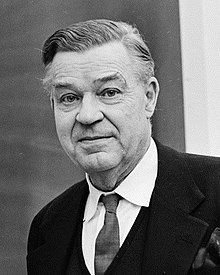
Back غونار ميردل Arabic جونار ميردل ARZ Gunnar Myrdal AST Qunnar Myurdal Azerbaijani قونار میردال AZB Гунар Мюрдаль Byelorussian Гунар Мюрдаль BE-X-OLD Гунар Мюрдал Bulgarian গুনার মিরডাল Bengali/Bangla Gunnar Myrdal Catalan
Gunnar Myrdal | |
|---|---|
 Myrdal in 1964 | |
| Born | Karl Gunnar Myrdal 6 December 1898 Skattungbyn, Sweden |
| Died | 17 May 1987 (aged 88) Trångsund, Sweden |
| Education | Stockholm University |
| Spouse | |
| Children | 3, including Sissela Bok and Jan Myrdal |
| Relatives | Stefan Fölster (grandson) |
| Academic career | |
| Field | Macroeconomics, sociology |
| Institution | Stockholm University New York University Geneva Graduate Institute |
| School or tradition | Stockholm school |
| Doctoral advisor | Gustav Cassel |
| Doctoral students | |
| Influences | Knut Wicksell John R. Commons[1] Raúl Prebisch |
| Contributions | Monetary equilibrium, ex-ante, circular cumulative causation |
| Awards | Nobel Memorial Prize in Economic Sciences (1974)[2] Bronislaw Malinowski Award (1975) |
| Signature | |
 | |
Karl Gunnar Myrdal (/ˈmɜːrdɑːl, ˈmɪər-/ MUR-dahl, MEER-; Swedish: [ˈɡɵ̌nːar ˈmy̌ːɖɑːl]; 6 December 1898 – 17 May 1987) was a Swedish economist and sociologist. In 1974, he received the Nobel Memorial Prize in Economic Sciences along with Friedrich Hayek for "their pioneering work in the theory of money and economic fluctuations and for their penetrating analysis of the interdependence of economic, social and institutional phenomena."[2] When his wife, Alva Myrdal, received the Nobel Peace Prize in 1982, they became the fourth ever married couple to have won Nobel Prizes, and the first and only to win independent of each other (versus a shared Nobel Prize by scientist spouses).
Myrdal is best known in the United States for his study of race relations, which culminated in his book An American Dilemma: The Negro Problem and Modern Democracy. The study was influential in the 1954 landmark U.S. Supreme Court decision Brown v. Board of Education. In Sweden, his work and political influence were important to the establishment of the Folkhemmet and the welfare state.[3]
- ^ Jackson, Walter A. (1 February 1994). Gunnar Myrdal and America's Conscience: Social Engineering and Racial Liberalism, 1938-1987. UNC Press Books. ISBN 978-0-8078-4460-1.
- ^ a b Gunnar Myrdal on Nobelprize.org , accessed 3 May 2020
- ^ Carlson, Benny (2018). Swedish Economists in the 1930s Debate on Economic Planning. doi:10.1007/978-3-030-03700-0. ISBN 978-3-030-03699-7.